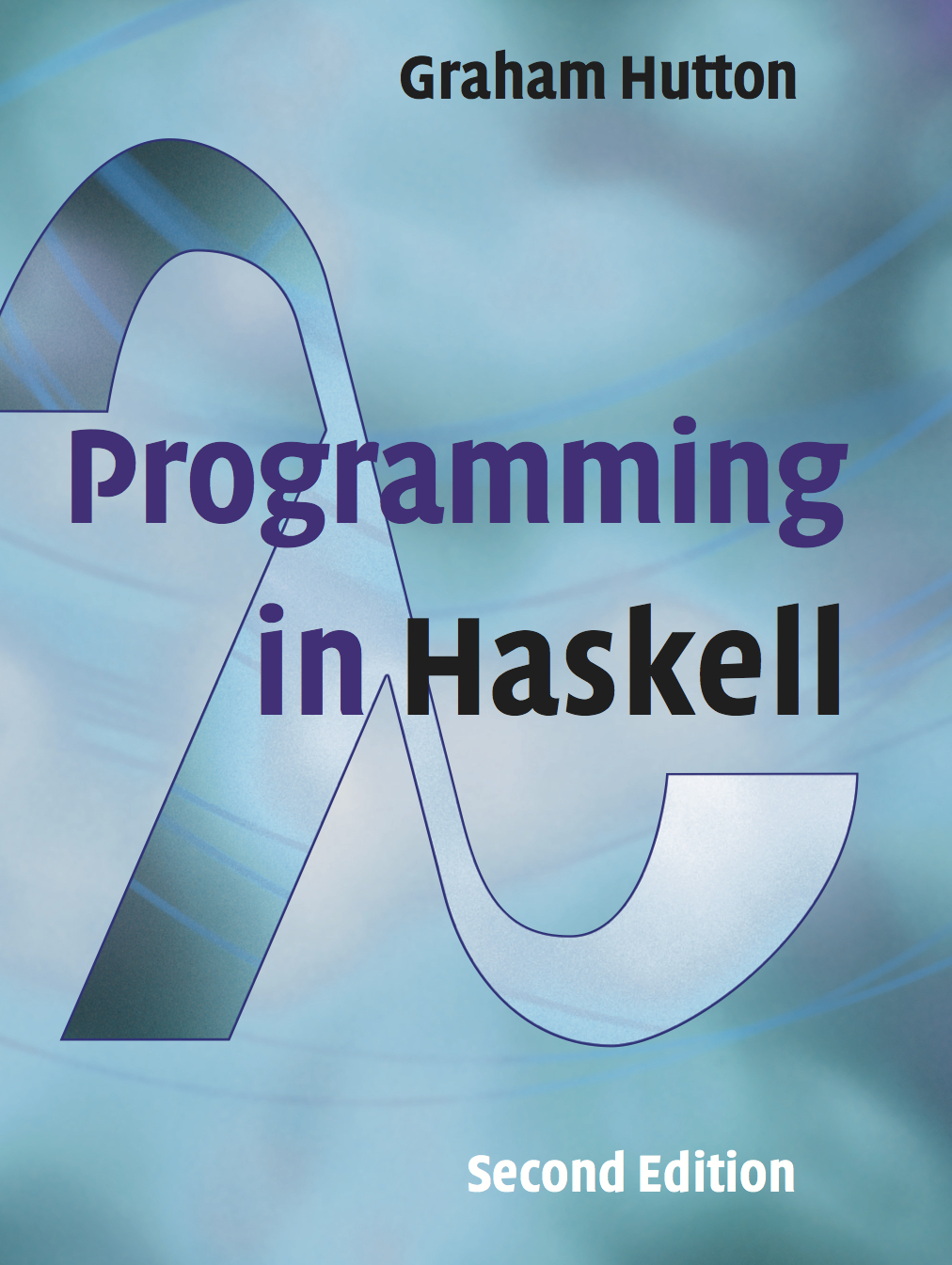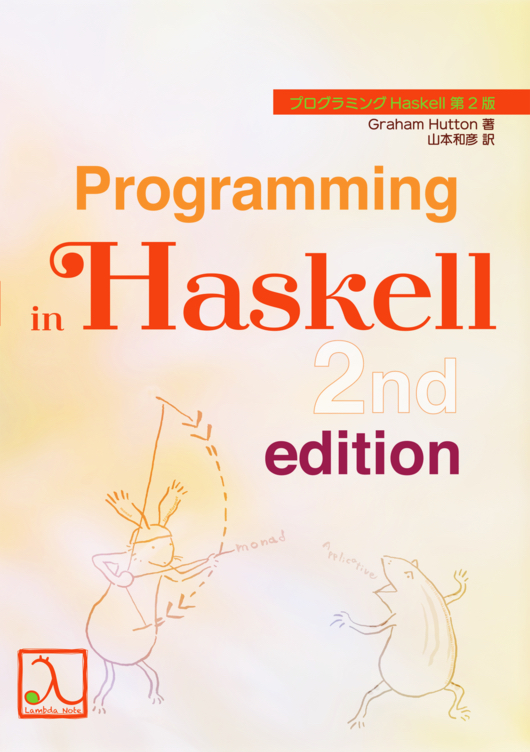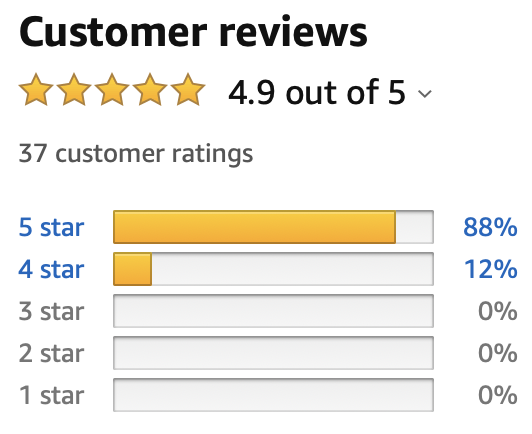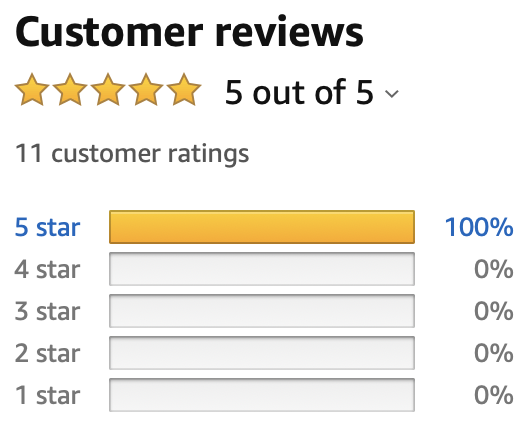

Programming in Haskell
Paperback: ISBN 978-1316626221; Kindle: ASIN B01JGMEA3U
318 pages, 120 exercises
Description
Haskell is a purely functional language that allows programmers to rapidly develop software that is clear, concise and correct. This book is based on the author's experience of teaching Haskell for more than twenty years. All concepts are explained from first principles and no programming experience is required, making the book accessible to a broad spectrum of readers.
Part I introduces the basic concepts of pure programming in Haskell and is structured around the core features of the language. Part II covers impure programming and a range of more advanced topics. The book contains many extended programming examples, and each chapter includes a series of exercises and suggestions for further reading.
This new edition has been extensively updated and expanded to include recent and more advanced features of Haskell, new examples and exercises, selected solutions, and freely downloadable lecture videos, slides and example code. The presentation is clean and simple, while also being fully compliant with the latest version of the language, including recent changes concerning applicative, monadic, foldable and traversable types.
Graham Hutton is Professor of Computer Science at the University of Nottingham.
He has taught Haskell to thousands of students and received many awards for
his teaching. Hutton has served as an editor of the Journal of Functional
Programming, Chair of the Haskell Symposium and the International Conference on
Functional Programming, Vice-Chair of the ACM Special Interest Group on
Programming Languages, and he is an ACM Distinguished Scientist.
Contents
The table of contents, foreword, preface and first two chapters can be viewed here.
Foreword
Preface
Part I. Basic Concepts:
1. Introduction
2. First steps
3. Types and classes
4. Defining functions
5. List comprehensions
6. Recursive functions
7. Higher-order functions
8. Declaring types and classes
9. The countdown problem
Part II. Going Further:
10. Interactive programming
11. Unbeatable tic-tac-toe
12. Monads and more
13. Monadic parsing
14. Foldables and friends
15. Lazy evaluation
16. Reasoning about programs
17. Calculating compilers
Appendix A. Selected solutions
Appendix B. Standard prelude
Bibliography
Index
Feedback
The master of Haskell education.
-- Stephanie Weirich, University of Pennsylvania
This book will make you a much better programmer.
-- Erik Meijer, Facebook
The monad stuff alone is worth the price.
-- Neil Mitchell on twitter
A model textbook on functional programming in Haskell.
-- Aaron Stump on amazon.com
This is a beautiful book for people who want to learn Haskell.
-- Emre Sevinc on amazon.com
This book is a gem and I cannot recommend it highly enough.
-- Guillaume Koenig on amazon.com
I have seldom encountered a book so well written as this one and still so complete.
-- Gilberto Filè on amazon.com
The presentation of each topic, the exercises, and the writing in general, are all superb.
-- Peter Summerland on amazon.com
This book is a masterpiece of functional programming.
-- Felipe Balbi on amazon.com
The author's deep understanding of Haskell shines through the writing.
-- Eli Bendersky on amazon.com
Buy this book or pester someone to buy it for you. It's worth it.
-- Vilem-Benjamin Liepelt on amazon.co.uk
Loved it! Distilled complex concepts to simple components.
-- Dragan Glumac on amazon.co.uk
I really can't recommend this book enough.
-- Jose Lopez on goodreads
This is such an excellent book, I wish there were more like it.
-- Dionysia Sofos on goodreads
Clean writing, careful exposition, wonderful examples & valuable exercises.
-- Brody Berg on twitter
Refreshing brevity compared to any other book I've seen.
-- Bodil Stokke on twitter
Grab Hutton's new edition of Programming in Haskell, it's wonderful.
-- Rein Henrichs on twitter
The best book to learn Haskell the right way.
-- Truong Hoang Dung on twitter
Absolutely sublime book that made me finally "get" Haskell.
-- Timmy Jose on twitter
Videos
Introductory course based on chapters 1 to 9.
Advanced course based on chapters 12 and 16.
Interview about the book.
Additional videos for specific chapters:
4. Defining functions
12. Monads and more
13. Monadic parsing
15. Lazy evaluation
16. Reasoning about programs
17. Calculating compilers
Slides
Lecture slides for chapters 1-10 and 15 are available in a
zip file.
These slides may be used or modified for any educational or
training purpose provided the original author is acknowledged.
Code
Haskell code for all the extended programming examples is available in a
zip file.
Instructors
Course instructors can request an
inspection copy of the book,
together with a large collection of introductory and advanced
exams and answers
based on the content.
Errata
All known errata are listed here.
Please contact the author
if you spot any further issues.

